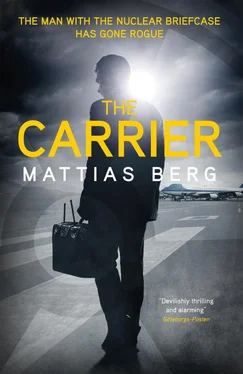Mattias Berg - The Carrier
Здесь есть возможность читать онлайн «Mattias Berg - The Carrier» весь текст электронной книги совершенно бесплатно (целиком полную версию без сокращений). В некоторых случаях можно слушать аудио, скачать через торрент в формате fb2 и присутствует краткое содержание. Город: London, Год выпуска: 2019, ISBN: 2019, Издательство: MacLehose Press, Жанр: Триллер, на английском языке. Описание произведения, (предисловие) а так же отзывы посетителей доступны на портале библиотеки ЛибКат.
- Название:The Carrier
- Автор:
- Издательство:MacLehose Press
- Жанр:
- Год:2019
- Город:London
- ISBN:978-0-85705-788-4
- Рейтинг книги:4 / 5. Голосов: 1
-
Избранное:Добавить в избранное
- Отзывы:
-
Ваша оценка:
- 80
- 1
- 2
- 3
- 4
- 5
The Carrier: краткое содержание, описание и аннотация
Предлагаем к чтению аннотацию, описание, краткое содержание или предисловие (зависит от того, что написал сам автор книги «The Carrier»). Если вы не нашли необходимую информацию о книге — напишите в комментариях, мы постараемся отыскать её.
The Carrier — читать онлайн бесплатно полную книгу (весь текст) целиком
Ниже представлен текст книги, разбитый по страницам. Система сохранения места последней прочитанной страницы, позволяет с удобством читать онлайн бесплатно книгу «The Carrier», без необходимости каждый раз заново искать на чём Вы остановились. Поставьте закладку, и сможете в любой момент перейти на страницу, на которой закончили чтение.
Интервал:
Закладка:
“She said… you had been… textile… designer… Mexico. You make… beautiful… thig… things.”
Jesús María hesitated for a second, let go a little, tightened again—before finally releasing. But probably not thanks to my flattery. More likely because she had realized what so many torturers had before her: a dead informant loses all meaning. His value falls from one hundred to zero.
“True. You can check for yourself, Erasmo. Follow the pattern and even someone like you should be able to understand.”
Some kind of fabric suddenly enveloped me, until I was covered closely in it from head to toe, like a body stocking. I could probably have freed myself, especially someone skilled like me. If Jesús María had not also tied me to both the gorilla and the chimpanzee.
So eventually Ingrid had to free me—once she had found me in the dark, among all the decaying stuffed animals. First she tried to undo the impossible knots. Then she cut them open, before putting the briefcase back in my hand and helping me out of the display case.
Long before that, Jesús María had given me a piece of advice. I only just heard it through the thick glass, her voice whispering as she closed the door of the display case on me, on her way back into the smaller of the rock chambers.
“But don’t believe a single goddamn word that witch says, Erasmo. Take my word for it. She can pull the wool over anyone’s eyes.”
2.07
I had spent days and nights reading the reports. Tested myself again and again, against those who did suffer breakdowns. Edelweiss also insisted that we must have the essential parts of the report in our combat packs. That we should never forget those hidden risks. That we, or someone else in our immediate surroundings—even within NUCLEUS itself—could be the very one the report anticipated. The Chosen One. The Destroyer. The carrier of the disease.
The initials of the classic 1958 report, “On the Risk of an Accidental or Unauthorized Nuclear Detonation”, seemed to be a play on the name of the research institute, the R.A.N.D. Corporation, and described at least one case of great importance. A heavily intoxicated officer managed to overpower the guards at a nuclear weapons base and started to make his way in among the rockets at the launch pad. The intruder was stopped in time, and no details of what had happened had leaked out.
The type of incident that went on all the time, and hardly anyone was aware of it. Our world of secrets, that strange little snow globe.
At that point, more than half a century ago, the American air-force alone had twenty thousand personnel who worked more or less directly with nuclear weapons. Not even a medical diagnosis of “occasional psychosis” was a bar to recruitment. Each year a few hundred were transferred to other duties on the grounds that they had exactly those symptoms—and according to the report an estimated ten to twenty people involved in managing nuclear weapons suffered psychological breakdowns every year.
The case notes were graphic, like literature, a horror movie. I still knew them by heart. One 23-year-old pilot, for example, was delusional. Some hours after speaking to a senior officer he was “overwhelmed with fantasies of tearing that person apart. He enjoyed the violence of the judo class. He felt like exploding when in crowded restaurants, though the feeling lessened when hostile fantasies of ‘tearing the place apart’ came to him.”
Flying warplanes became the ultimate liberation for him. Having the potential to hold the necessary power in his hand.
I read these case studies again, in a new light, horror-struck after Ingrid had presented her delusional plan at Sixten and Aina’s. Saw not only myself, but certainly her, in these psychological profiles.
Nor were the R.A.N.D. Corporation reports on “Deliberate Actions as a Cause of Unauthorized Detonation” comforting: “We are here concerned with unauthorized acts that are done more or less deliberately with an intent to bring about the detonation of a nuclear weapon. By and large, intentional acts will not be prevented by the safety measures that are effective against human error, such as the requirement for several independent steps in the arming process, safeguards which prevent inadvertent manipulation, and training personnel to maintain safe procedures.
“The borderline between an inadvertent mistake and a deliberate unauthorized action is vague. On the one hand, subconscious motivations may contribute to certain apparent errors; on the other hand, they may lead to actions that seem to be deliberate. An intent to cause destruction may be perfectly clear to the person who performs a certain act, or it may be concealed from him in his subconscious; it may be persistent and lead to a long-range plot, or it may arise as a fleeting impulse. For some seemingly deliberate acts, no motive at all can be discovered.”
I read on, put the neutral leaflet that Edelweiss had made of the central pages of the report down on the blanket and then my notebook over it, hiding any sign of what I was reading. Trying not to glance at Ingrid in the bunk beside me.
“The most dangerous disorders are those of the paranoid group. Advance detection is often difficult because persons afflicted with such disorders can act conventionally enough to avoid arousing suspicion. There are two delusional complexes frequently observed in people with paranoia or paranoid disorders which could bring forth the intent to cause an unauthorized nuclear detonation. One is the desire to seek fame—even by a purely negative act—and to immortalize one’s name. The other complex is the idea of having a special mission in history.
“The interval between the hatching of the destructive idea and the actual attempt may last anywhere from a few weeks to several years, during which these madmen can sometimes plan shrewdly, watching for an opportunity to carry out their intentions. It is this kind of methodical plotting which is particularly serious for nuclear weapons safety.”
I had a feeling that Ingrid gave me a look, as if wanting to ask me something. I sensed her warmth and intensity. But I went on reading:
“More frequent than these paranoid acts are senseless destructive acts committed as a result of impulse disorders or psychopathy. Usually they do not have the scope and magnitude of the paranoid group, but if they involve highly destructive tools they can also lead to catastrophe. But familiarity with nuclear weapons may also breed carelessness. Moreover, people with certain impulse disorders may even be tempted by the power of the weapon and its potential destructiveness, giving them the feeling of excitement, adventure, and drama. Pyromaniacs, for example, frequently desire to see tangible evidence of their personal power on a large scale and may plan for months to obtain jobs in hospitals or even in the fire department itself.”
And then the conclusion in the psychiatric appendix, the last part Edelweiss had put in his extract of the report. The chilling fact that what was called “Unauthorized Nuclear Detonation” was the perfect fantasy for people with paranoid tendencies—and that they were often drawn to precisely this sector.
Just because nuclear weapons provided the possibility of catastrophe “of a magnitude unknown to persons who might have been similarly tempted in the past. Nuclear weapons will not only make acts technically possible that could scarcely have been dreamed of before, but they may even constitute a specific attraction for those with paranoid potentialities. In fact, in certain paranoid delusions, a nuclear detonation may seem the ideal tool for translating the fantasies into reality.”
So here I was: in the company of what seemed like at least two such lunatics, on the run, hidden from the rest of the world.
Читать дальшеИнтервал:
Закладка:
Похожие книги на «The Carrier»
Представляем Вашему вниманию похожие книги на «The Carrier» списком для выбора. Мы отобрали схожую по названию и смыслу литературу в надежде предоставить читателям больше вариантов отыскать новые, интересные, ещё непрочитанные произведения.
Обсуждение, отзывы о книге «The Carrier» и просто собственные мнения читателей. Оставьте ваши комментарии, напишите, что Вы думаете о произведении, его смысле или главных героях. Укажите что конкретно понравилось, а что нет, и почему Вы так считаете.












